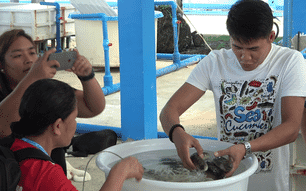The appointment flags one of the core values of NPC's desert coastal aquaculture business, which is not simply to maintain and preserve the environment in which the prawns and soon (sea cucumbers and greater Amberjack), breed, but to ensure the commercial longevity of the entire operation.
"The ponds and culture have been meticulously engineered from the beginning. The real challenge is to scale up the business while working on these foundations of sustainable development and to ensure these are maintained, improved and embedded in our corporate culture to the highest possible level as NPC grows," Mr Millet explained.
Mr Millet's task is to integrate all the components of prawn production from hatchery through to delivery to the customer in such a way that they are working towards the same goal of long-term sustainability. Millet's role is cross-functional and five departments report to him directly: Laboratory Services, Biosecurity, Research & Development, Quality Systems, and Environmental Protection & Management.
"We do not push the ecosystem to its limit. We prefer to extend the system to the maximum that is sustainable through an "All In All Out" strategy within the capabilities of the local environment in a way that leaves it in good condition," said Mr Millet. NPC took the long-term view with a 20 year extendable strategy to develop a prawn industry in Saudi Arabia, rather than a five year plan for maximum short term returns.
Mr Millet said that in many areas NPC had achieved an optimal balance, for example in the maintenance and preparation of the ponds in terms of their ecology and condition to avoid any outbreak of disease. "We need to expand and integrate this thinking across all non-farming aspects of the business," he said.
All the component areas of the operation - breeding, feeding and cleaning have to work together in parallel and all at the same target. "Everyone needs to be focused on the same goal - that of sustainability."
Mr Millet was called in at the growth stage of the 250 km2 project to drive the company forward while ensuring that sustainability in all areas was further developed and maintained.
"You need to anticipate the issues and this we did right from the start. So it is not a matter of overcoming existing problems. We want to continue to improve our systems and processes within a clear, practical framework for sustainability as we develop and scale up the business. The target, at the project's full extension, is that we will have a minimal impact on the environment."
This involves a very complex and detailed computer-modeled water study to assess the environmental impact of the effluent, which is significantly below permissible international and Saudi standards.
Mr Millet is not working in a vacuum, which helps considerably with implementation. "We have a team of very experienced professionals who have worked for many years in the business, some on huge projects with enormous challenges, and who bring a strong culture of environmentally friendly management with them," Mr Millet said.
A strong and practical approach to sustainability is very necessary as NPC does not use any chemicals or antibiotics at all in its grow out operation. The environment in which the prawns live is in delicate balance and it is managed with great care. NPC has low density stocking in its 10ha ponds, strict biomass thresholds, and carefully monitors and manages water quality and oxygen levels at all times of the day and night. "We use nothing at all except the very best environmental management practice to sustain the pond natural balance. Very few producers can say that."
Mr Millet's long experience in aquaculture convinced him that there is no conflict between sustainability as a culture and sound business sense.
"Getting the balance right ensures a long term benefit for the workers in the company and for the shareholders because the product is of the highest possible quality. Consumers value this highly and their custom decides whether the company remains in business," said Millet "If we involve the environment, corporate culture and consumers into a truly sustainable system, then aquaculture has a bright future in Saudi Arabia."




